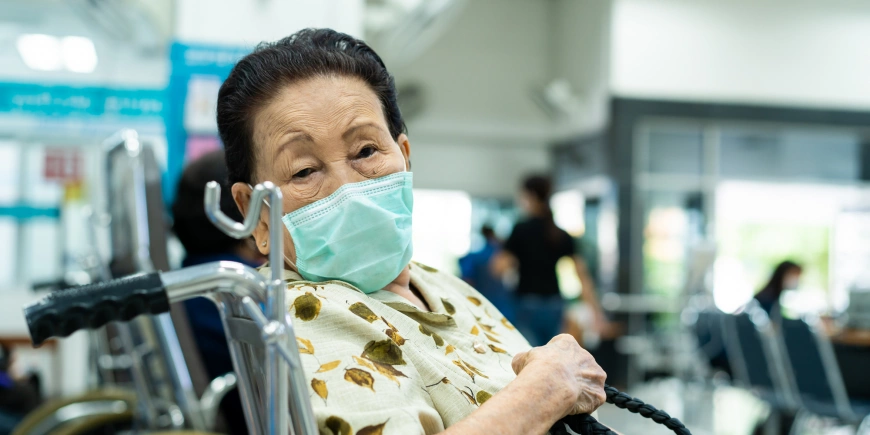Should I Stay or Should I Go: Elderly and At Risk During Covid-19

The current pandemic environment has changed many things about our lives. And for the elderly, and those with preexisting health conditions, these changes cannot be ignored. For this population, illness due to COVID-19 can come on rapidly and be life-threatening. It is important that appropriate precautions are taken to prevent infection and that decisions about end-of-life care and location be made in advance.
«Some seniors may choose the most aggressive treatment and want to be taken to a hospital to receive the maximum amount of care. Other seniors may prioritize the comfort of their own home and care by staff members that they know and are comfortable with.»
Should they receive care in the comfort of their own home or in the hospital? How much medical intervention do they want? How do underlying health conditions or age impact COVID-19 survival rates? There are many complex choices that must be made, research to be considered, and pros and cons to discuss. But the decisions that come from these discussions will ultimately be personal and reflect the unique situation of each individual.
Additional Risks and Associated Precautions
For the elderly, there are specific risks that aren’t present for other populations and targeted precautions should be taken. For those living in retirement communities, common rooms and communal meals pose a risk and should be avoided. And for those that live at home or with family, senior centers can act as sources of infection. To further reduce infection risk, the elderly should postpone all non-essential visits to the doctor such as annual eye exams and dental cleanings. And all their vaccines should be up-to-date, especially flu and pneumonia.
Stay at Home or Head to the Hospital?
In case these precautions aren’t enough, specific decisions about care must also be made. Seniors should weigh their options when deciding whether they prefer to remain at home or be transported to the hospital. Some seniors may choose the most aggressive treatment and want to be taken to a hospital to receive the maximum amount of care. Other seniors may prioritize the comfort of their own home and care by staff members that they know and are comfortable with. We now know most seniors who are put on a ventilator never recover. So it is even more important to provide relevant information about the available choices and discuss the individual’s wishes in advance.
When considering whether to stay at home or go to the hospital, it is important to note that there are more advanced and additional care options available at the hospital. However, the benefits of staying home such as comfort and familiar staff members may feel more appropriate for some patients. The chart below is a good starting point to discuss this decision. It provides information about each option so individuals can make the decision that is most appropriate for them and their unique situation.
Comparing Settings:
Home — Comfortable, familiar surroundings, Care provided by familiar staff/loved ones.
Hospital — More advanced treatment options, Ventilator access, 24/7 nursing care.
Both — Comfort care, CPR, Artificial hydration and nutrition, Hospice care.
While having these discussions with loved ones, remember to keep the discussion within the context of what is most important to them: spending time with loved ones, walking, independence, living as long as possible. Some additional items you may choose to discuss include:
What do you consider to be a good quality of life?
What values, goals, and wishes do you have regarding medical care if you were to become seriously ill from COVID-19? Whom do you trust to make medical decisions for you if you cannot speak?
Determining Your Options for Care
If the individual feels that staying at home is the best option, that discussion should be shared with the medical director of their facility or the head nurse in charge of their at-home care. If they currently have no home health assistance beyond a caregiver, they can contact a home health agency to review their options. During these conversations, be sure to express the individual’s wishes and fill out any required paperwork. Some additional questions that can be helpful to discuss include:
How do age or other health issues impact the risk of serious complications from COVID-19?
What treatment options are available here? How are these different from the options available at the hospital?
How do age or underlying health conditions impact the success rate of ventilator support due to COVID-19?
What options are there to be kept comfortable here if transportation to a hospital is not desired?
Documenting Loved One’s Wishes
To properly document these discussions and the wishes of the individual, update or complete an Advance Directive (AD) and, if applicable, a Physician Orders for Life-Saving Treatment (POLST). An AD documents an individual’s wishes in the case that they cannot express them independently. It also allows for the designation of a healthcare agent to make decisions for them if they are incapacitated. A POLST details the specific medical treatments desired during an emergency for patients with a short life expectancy.
Don’t wait to discuss and document these important details. Although prevention is an important step, being prepared in the case of infection helps ensure a smooth transition and confirms that the individual’s wishes will be followed throughout their medical journey. Ultimately, it’s most important for a patient’s voice to be heard, especially when they aren’t capable of communicating their wishes directly.
